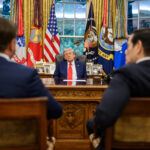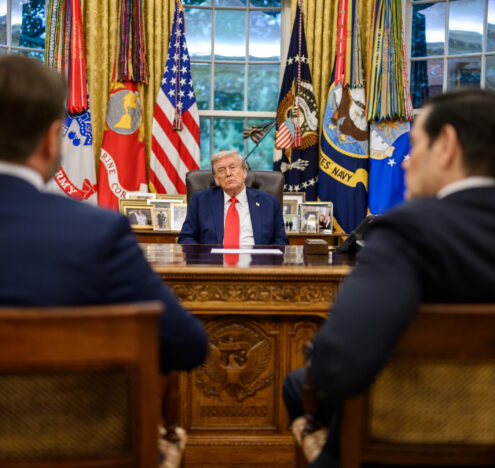A new piece by Bloomberg’s Anthony Capaccio underscores the lengths that the US government will go to in promoting weapons exports, regardless of whether they serve long-term US interests. The article focuses on the practice of offering discounts on major sales of US arms, at a cost of billions of dollars.
These discounts are the result of the routine practice of providing waivers of fees that are supposed to be imposed on foreign buyers of US arms to reimburse the United States for a share of the cost of developing those weapons in the first place. According to a 2018 report by the Government Accountability Office, waivers were granted in an astonishing 99% of sales between 2012 and 2017 for a total of $16 billion. Many of the exceptions were made for non-democratic governments, including a $3.5 billion discount to the Saudi regime for a Lockheed Martin missile defense system. These waivers are good news for arms clients and weapons companies, and bad news for US taxpayers.
The waivers are a longstanding practice predating the Trump administration. Rep. Jackie Speier (D-CA) has successfully inserted an amendment to the National Defense Authorization Act (NDAA) that would require advance notice to Congress before discounts are provided. Her perfectly reasonable proposal has generated howls of protest from the Pentagon and the arms lobby, arguing that giving Congress input up front would unnecessarily slow down the foreign military sales process, perhaps costing the US key deals in the process.
There is a real question as to whether these sales to Saudi Arabia should be happening at all – offering them at a discount just adds insult to injury.
As Speier told Bloomberg, her proposed change “ would give Congress the information it needs… to safeguard taxpayer dollars by stopping the DOD from letting wealthy Gulf nations off the hook when it comes to the money they owe the US for our valuable research and development.”
The protests of the Pentagon and its contractors over Speier’s amendment don’t hold up to scrutiny. The United States dominates the global arms trade in general and the trade to the war-torn Middle East in particular. Creating greater transparency over arms sales subsidies is unlikely to put a dent in the United States’ dominant position as the world’s leading arms trading nation. But blocking the ability of Congress to scrutinize the financial details of major arms sales does benefit one key constituency – major weapons contractors like Lockheed Martin, Boeing, Raytheon, and General Dynamics. To cite just one example, these four firms have been involved in roughly 90% of the $125 billion in US arms offers to Saudi Arabia over the past decade. Many of those deals for equipment that Saudi Arabia used in the brutal war in Yemen. There is a real question as to whether these sales to Saudi Arabia should be happening at all – offering them at a discount just adds insult to injury.
Arms sales discounts are just one element of a full-court press on the part of the Trump administration to bolster US arms exports. The president routinely touts US weapons offers as evidence of his skills as a deal maker, making hugely exaggerated estimates of the US jobs resulting from these exports along the way. His arms export policy directive makes promoting arms sales part of the job description of American diplomats. And he has blocked efforts by Congress to end US military support and arms sales to Saudi Arabia, despite the devastating impacts of the Saudi-led coalition’s war on Yemen and the murder of Washington Post columnist and regime critic Jamal Khashoggi. A stated reason for the president’s stubborn support of the Saudi regime is his unwillingness to risk losing the revenue.
Hopefully the debate over offering discounts on US arms sales will prompt a reconsideration of whether many of these deals make sense in the first place. This is true not just in the case of Saudi Arabia, but also in the Philippines, where the Duterte regime has killed thousands of civilians under the guise of its “war on drugs”; and in Turkey, where US-supplied arms are being used in the invasion of Syria. Congress has stepped up to the plate in opposing arms sales to Saudi Arabia for use in Yemen. Lawmakers need to play a stronger role in scrutinizing sales to other nations as well, in the interests of human rights and global security.
William D. Hartung is the director of the Arms and Security Project at the Center for International Policy.




















